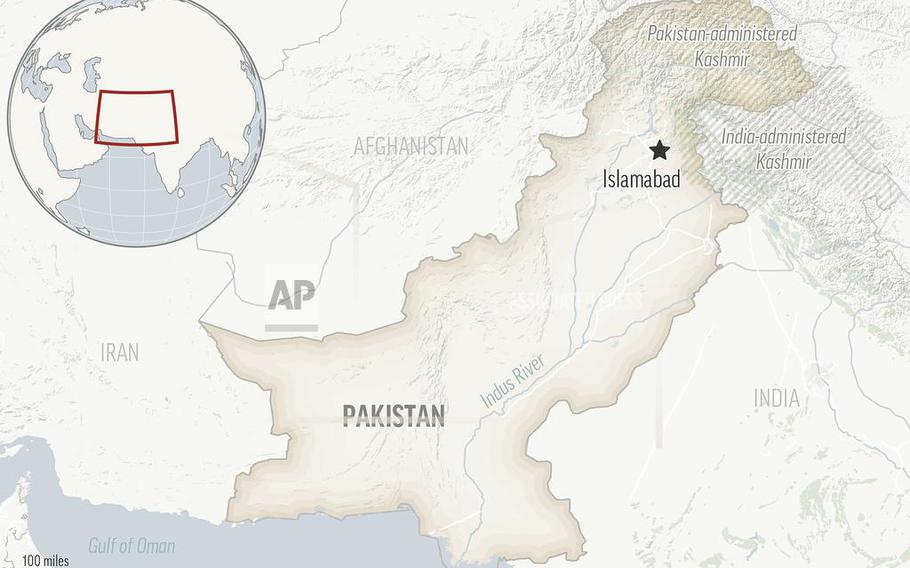
A map of Pakistan showing its capital, Islamabad. (AP)
ISLAMABAD — Afghan refugees on Friday appealed to Pakistan’s premier to ease a visa regime on humanitarian grounds after President Donald Trump paused the U.S. refugee programs.
Many Afghans whose visas have either expired or will expire soon fear arrest and deportation.
“We don’t know exactly when the pause of the U.S. refugee program will be lifted, but we request Pakistan to extend our stay for at least six months after the expiry of our visas,” said Ahmad Shah, a member of the Afghan USRAP Refugees advocacy group.
An estimated 20,000 Afghans are currently waiting in Pakistan to be approved for resettlement in the U.S. via an American government program.
Refugees approved to travel to the United States in coming days have had their travel plans canceled by the Trump administration. Among those affected are the more than 1,600 Afghans cleared to resettle in the U.S.
Pakistan says it is yet to receive any official information from the United States about the suspension. Afghans who are in the country were supposed to be relocated by September 2025.
The program was set up to help Afghans at risk under the Taliban because of their work with the U.S. government, media, aid agencies and rights groups. The U.S. pulled out of Afghanistan in 2021 when the Taliban took power.
But in its first days in office, Trump’s administration announced the U.S. Refugee Admissions Program would be suspended from Jan. 27 for at least three months.
Shah said most of the Afghans who are in transit to the United States were now living in a very difficult conditions. “We don’t want to live here permanently. We urge the Prime Minister Shehbaz Sharif to order authorities to extend the visas of Afghan people for at least six months,” he said.
He also urged the United Nations refugee agency and the International Organization for Migration to help Afghans who are waiting for relocation. “If the UNHCR and IOM don’t help us in this difficult situation, who will rise his or her voice for us?” Shah said.
Meanwhile, there is uncertainty among many over their future.
Dozens of Afghan women holding placards gathered in Islamabad to discuss the situation. They urged Trump to restore the refugee program and asked Pakistan to ease restrictions on them.
“We have no other choice except to go to the United States, as we have lost everything here. We request Trump that we are in very difficult times and we have nothing to survive,” said Saanga Bibi, a widow. She said her family is compelled to skip either lunch or dinner to save money for the fees to extend their visas each month.
Another woman, Bibi Habiba, asked Pakistan reduce the exorbitant visa fee, saying, “We want nothing more than that.”
The advocacy group said Afghan risked their lives to serve as interpreters, contractors, human rights defenders, and allies of the U.S. mission in Afghanistan. “The Taliban view us as enemies, and returning to Afghanistan would mean arrest, torture, or death,” it said in an appeal to Trump, rights defenders and U.S. authorities.
“This suspension breaks the promises made to those who stood by the United States,” it said.
Sarfraz Ahmed, a journalist who fled to Pakistan from Afghanistan when the Taliban seized power, said Friday he had been expecting to receive a call confirming his travel plans, but the suspension changed everything.
Khalid Khan, a former Afghan army captain who worked for the Afghan air force and helped the U.S. air force during operations against the Afghan Taliban and other groups, fled his country along with his family in 2023. “I will be in a trouble if I am sent back to Afghanistan,” he said.
Pakistan’s Ministry of Foreign Affairs said there is an agreement with Washington to take Afghans who are in Pakistan to the United States for resettlement by September 2025.
“The arrangements are in place. We have, so far officially, not received any further information on this issue,” ministry spokesman Shafqat Ali Khan told a news briefing in Islamabad on Thursday.
The Taliban has deprived 1.4 million Afghan girls of schooling through bans, according to the United Nations. Afghanistan is the only country in the world that bans female secondary and higher education.